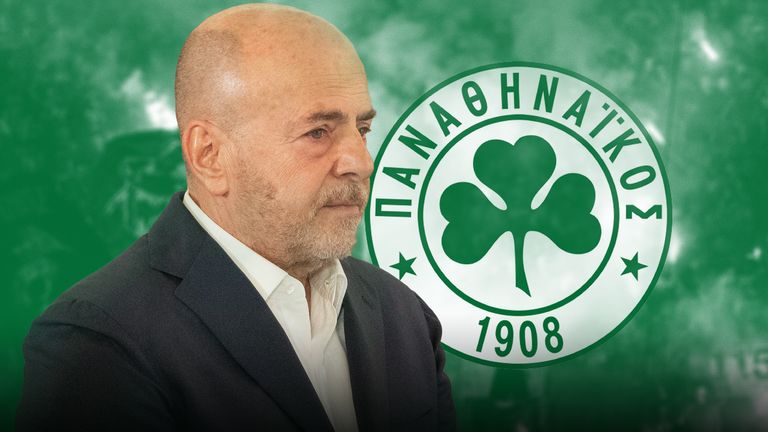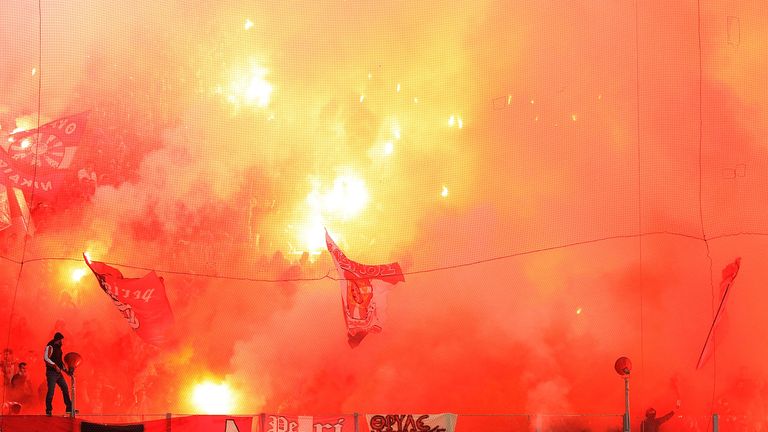Panathinaikos president Giannis Alafouzos on 'culture of violence' in Greek football and finding a way through
In an exclusive interview with Sky Sports, Panathinaikos president Giannis Alafouzos discusses the challenges Greek football is trying to overcome after years of corruption, violence and financial problems. There was more trouble against Olympiakos on Sunday
Tuesday 24 October 2023 10:06, UK
Olympiakos versus Panathinaikos, the so-called Derby of the Eternal Enemies, is among the most super-charged in European football. On Sunday, it was suspended with the scores level after Panathinaikos substitute Juan Carlos was struck by a firework.
It is just the latest troubling incident in Greek football, where the game has been threatened for over a decade now by violence in the stands, corruption trials in the courts, and the financial implications of a broken system. Everyone is tired of it. Even those involved.
For Giannis Alafouzos, Panathinaikos' president, this should be his dream role. He still recalls being suspended from school as a result of his love for the club. "I ran away to watch us play Everton in the quarter-final of the European Cup," he tells Sky Sports.
That was 1971, the year that Panathinaikos reached the final of the competition at Wembley. The years since have brought stresses and strains, particularly since he took charge in 2012. Asked if he is enjoying the job, he could not be clearer.
"No," he replies. Why not? Panathinaikos are back in Europe, at least. "I have suffered so much and in so many areas. I think it would take a lot of success for me to enjoy it. Right now, I am on duty. Doing something that is incredibly painful and hard."
Alafouzos, 66, paints a bleak picture.
It is not just that rivals Olympiakos have won 22 of the last 27 titles. Greek football has spent years mired in corruption and its consequences. "When fans are desperate and feel games are being stolen they become violent," he says.
"In Greece, we have a culture of violence. The rule of law does not apply, unfortunately. We had a situation where we had corruption, a struggling economy, one team dominating and a violent culture among the fans. People did not go to games. Sponsors walked away."
This dominance of Olympiakos is the prism through which Panathinaikos have viewed football. Champions League money has fuelled the disparity. In 20 of these last 27 seasons, Olympiakos have played in its group stages, reaping the financial rewards.
Panathinaikos have not been there in 12 years, edged out by Braga in a play-off earlier this season. This is the first time in seven years that they have even qualified for the group stage of the Europa League. "It is very frustrating for two reasons," Alafouzos explains.
"First of all, the big teams from the main countries see their incomes increasing and multiplying." Competing internationally becomes impossible. But it is the gulf that then develops between the domestic Champions League team and the rest as well.
"One team goes to the Champions League almost every year and gets millions from that while the other teams in Greece have a total income far less. Olympiakos would get €30 million from being in Europe. Panathinaikos' total income last year was €10 million.
"The federation also chooses their players for the national team and they can sell those players more easily and for more money as they are better known from playing in Europe. It created huge problems for every team but Olympiakos. It aggravated the situation."
Panathinaikos tried to compete.
"But we made mistakes," says Alafouzos.
"Rather than trying to do it differently, we copied Olympiakos. We spent a huge amount of money. When the owners did not have any more money, they left the team with an expensive roster and a lot of debt." In 2012, Panathinaikos were in a mess.
Alafouzos stepped in with a different vision for a club with a stated support of around two million people. "We are still the biggest club in Athens," he says, proudly.
"Ever since I was a kid, I had this idea that the team should not be owned by one person. I was a bit romantic. I felt the team must be owned by its fans so I started the Athenian Alliance, thinking that we had 100,000 core fans who would pay €500 a year.
"If this had been the case, we would have had an income of €50m a year and this would have made a huge difference. Unfortunately, it was not the case. We only had 6,000 to 7,000 willing members and they paid a much smaller amount than we expected.
"The country was nearly bankrupt. People did not have money to spare. But it was also because the previous owners transmitted the idea that the club could pay for everything. Going from a model of excess to one where everybody had to contribute did not work."
He tried to find investment from elsewhere. There were talks with prospective Thai owners before he accepted he would have to do it himself, taking a longer-term view. "Slowly, we have repaid the debt and we have been rebuilding the team ever since," he says.
"In football, you have to spend money to get things going. There is no other way. My business did better so I was able to put more money in. Initially, to pay off the debt. Then, to invest in the roster. I was able to bring in Ivan Jovanovic, a very good coach.
"Our income has increased and this year it will increase more because of our participation in Europe. Through a lot of hard work, we are trying to build up our academy, adding new pitches. We are doing everything we can to build up the team from its roots."
The fight against corruption is being won, he insists. The introduction of VAR has helped, as has the intervention of UEFA with the use of foreign referees. "Shining a light on it is the only way to stop corruption. If it is done under the table, situations can continue," he says.
"The refereeing is better today. That is why you are seeing a renaissance in Greek football with four teams competing in European competition and a more competitive championship because before this there were people controlling the federation and the referees."
But the fight against violence is ongoing.
The firework incident against Olympiakos was not an isolated one.
In August, there was a far graver offence committed. So-called ultras from Dinamo Zagreb travelled to Greece for a Champions League qualification game against AEK Athens, apparently intent on trouble. AEK supporter Michalis Katsouris was stabbed to death.
"It was terrible that this happened. The police could very easily have stopped it. They have huge responsibility and they were ineffective. This is what I mean by the rule of law in Greece. Many times if you break the law and are violent, you do not get punished."
Panathinaikos were drawn into the affair. When they hosted AEK last month, their own ultras, affiliated with Dinamo, displayed a banner in support of the Croatians being held by police in connection with the offence. Alafouzos insists that the matter is complicated.
"We pushed as much as we could and the banner was pulled down after one minute. The whole stadium booed when it was opened up. That was very impressive. But it should never have gone up. It was a 40 metre banner. Why did it go through police controls?
"On the other hand, can the police confiscate that? Perhaps a judge could say it would incite violence. But it is not easy to stop. Not with the security we have. They cannot interfere with the ultras. They would just be beaten up and the police would not protect them.
"It is a small minority. Kids without a hope. The social situation is degrading all over Europe. There is this 20 per cent becoming more poor and more desperate. They have not found ways of improving the lives of the less well off. That is the breeding ground."
Alafouzos does not want to be seen as an apologist. "It was an appalling act. People should not be killed in the street." But he rejects the idea that clubs are complicit. "It is bad for the clubs. They get fined. They get a bad reputation. No club benefits from it."
Against this backdrop, optimism for the future is difficult.
But Panathinaikos continue to forge a path forwards.
"We are building a new stadium. The municipal government have decided that they want the land where our current stadium is to turn it into a big park, an open space. In exchange, they are building a stadium elsewhere in the city that we are renting for 99 years."
The ambition is to complete the new stadium, licensed to seat 40,000 fans, in 2026. It will be a modern arena more accommodating for supporters and in a developing area close to the centre of Athens. "This will certainly give us more impetus for the future."
Panathinaikos will continue to own its own training ground that includes six pitches and now houses their women's team too. Alafouzos takes pride in this development. "We are progressing and trying hard to become a modern self-sufficient club."
But, for now, these incidents continue to undermine Greek football.



![Images drawn up show the plan for the new Panathinaikos stadium [Credit: A&S Architects]](https://e0.365dm.com/23/10/768x432/skysports-panathinaikos-stadium_6333479.jpg?20231024092955)

